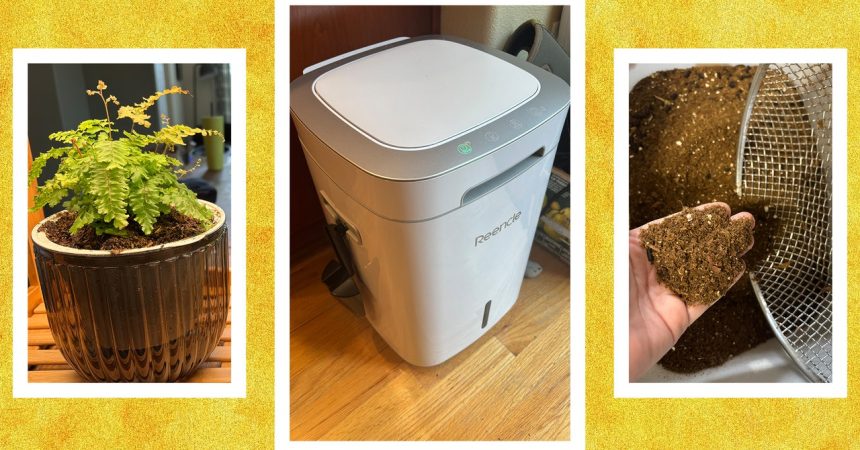The quest for sustainable kitchen practices often leads to the exploration of composting solutions. While traditional outdoor composting remains a viable option, the rise of electric kitchen composters has sparked curiosity and debate. Are these sleek appliances genuinely effective tools for reducing food waste and creating valuable compost, or are they merely a trendy, expensive manifestation of “greenwashing”? The answer, it seems, depends on the specific appliance and one’s expectations. A comparison between two approaches – the Mill Food Recycler and the Reencle Prime – highlights the spectrum of these devices and their varying capabilities. The Mill essentially grinds and dries food scraps, creating a shelf-stable version of the original waste, suitable for garden use with some effort. However, it doesn’t facilitate true decomposition or cultivate beneficial bacteria. This contrasts sharply with the Reencle Prime, which aims to produce genuine compost.
The Reencle Prime, a compact appliance measuring 14 x 15 x 22 inches, operates with the aid of ReencleMicrobe, a starter mix containing sawdust, activated carbon, and Bacillus bacteria. This blend facilitates the decomposition process within the machine. Over a three-month trial period, the Reencle Prime proved to be unobtrusive, quietly processing kitchen scraps daily. Its simple interface features buttons for power, drying excess moisture, odor purification, and manual lid opening, supplemented by a sensor for automated lid operation. The resulting compost’s efficacy was tested in a small-scale experiment, pitting it against standard potting soil in a plant growth trial. Two nearly identical maidenhair ferns were potted, one in the Reencle compost mix and the other in regular potting soil. After 30 days, the fern grown in the compost-enriched soil exhibited noticeable advantages, appearing shorter but demonstrably fuller and healthier.
This seemingly small victory underscores the potential of in-home electric composting, particularly for those lacking access to municipal composting programs. The Reencle Prime’s success in generating usable compost contrasts with the Mill Food Recycler’s approach of simply reducing and preserving food waste. The Reencle’s ability to create a soil amendment that demonstrably benefits plant growth lends credence to its claims of facilitating true composting. While the Mill caters to a different need – reducing food waste volume and creating a stable, albeit uncomposted, material – the Reencle Prime addresses the desire for true compost creation within the convenience of one’s kitchen. This distinction is crucial for discerning consumers seeking a solution that not only diverts food waste from landfills but also generates a valuable resource for gardening and plant cultivation.
The question of cost and kitchen real estate remains a valid concern for those considering electric composters. However, the potential benefits – reduced environmental impact, creation of nutrient-rich compost, and convenience – may outweigh these considerations for many. Furthermore, the Reencle Prime’s success in a head-to-head plant growth comparison provides tangible evidence of its efficacy. This contrasts with the Mill Food Recycler, which, while useful for reducing waste volume, doesn’t produce actual compost. The implications of this difference are significant, particularly for gardening enthusiasts and those seeking to minimize their environmental footprint. The Reencle Prime’s compost, by fostering demonstrably healthier plant growth, suggests a level of nutrient enrichment and biological activity that surpasses the mere reduction and stabilization offered by the Mill.
The broader context of food waste and its environmental consequences adds further weight to the argument for effective composting solutions. With up to 40% of food produced in the US ending up in landfills, where it contributes to greenhouse gas emissions, the need for accessible and efficient composting methods is clear. While municipal composting programs represent the ideal solution, the reality for many is a lack of such programs in their areas. This gap highlights the potential role of electric kitchen composters like the Reencle Prime in diverting food waste from landfills and contributing to a more sustainable lifestyle. The Reencle Prime’s relatively compact size also addresses the issue of limited kitchen space, making it a more feasible option for apartment dwellers and those with smaller kitchens.
In conclusion, the Reencle Prime distinguishes itself from other electric composters by producing true compost that demonstrably benefits plant growth. This sets it apart from devices like the Mill Food Recycler, which focus on reducing and preserving food waste rather than facilitating true decomposition. The Reencle Prime’s performance in the plant growth experiment, where the fern grown in its compost outperformed the one grown in standard potting soil, provides tangible evidence of its efficacy. This, coupled with its relatively compact size and ease of use, makes the Reencle Prime a compelling option for those seeking a convenient and effective way to compost kitchen scraps and contribute to a more sustainable lifestyle. While the initial cost may seem high, the long-term benefits, including reduced environmental impact and the creation of valuable compost, can make it a worthwhile investment.



